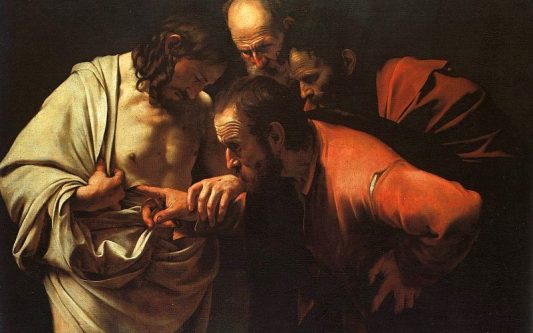
Blood Covenant
The closing prayer in the New Testament letter called Hebrews starts out:
The God of peace, who led up out of the dead The Great Shepherd of the sheep by blood of an eternal covenant, Jesus Christ our Lord,… [1]This is my own translation which is about as literal as I can get and still make it legible English. Most translations say “the blood of the eternal covenant”, but the articles (the) are … Continue reading
I began to wonder if there is something intrinsic to our universe and existence that makes the phrase “blood of an eternal covenant” not just something of religious interest, but a fundamental necessity.
First I note that by using natural means of investigation three facts about the universe have thus far eluded the best minds: its ultimate extent, its ultimate composition, and our ultimate role or significance in it.
Consider for a moment the extent of our universe.
We marvel at the lofty heights of the earth’s mountains and are impressed by the extreme depths of the ocean trenches. Yet if the earth were shrunk to the size of a billiard ball, it would not be less smooth than the billiard ball! Even the great expanse of our spacious atmosphere would be hardly noticeable at about one hundredth of an inch thickness. The grand landscapes we marvel at are insignificant compared to the entire planet. What about compared to the universe?
Travel to the star nearest our Sun and look back. You will be hard pressed to find this enormous billiard ball we call home. Run over to the nearest neighboring galaxy and look back. Our Milky Way galaxy would simply be one among an estimated 200 billion that are visible. The edge of the observable universe is an incomprehensible 45 billion light years away.
This is amazing, but it leads me to ask – what lies beyond the edge?
Consider the composition of the everyday materials we depend upon for life, for constructing our tools and toys, and for our bodies.
They are made up of tiny things we call atoms. Their configuration seems to determine every characteristic of the universe. Yet atoms are mostly empty space. It makes us feel more secure and in charge that we have names for the components of atoms: electrons, protons, and neutrons. But these are names not of things, but of phenomena. It turns out that their make up is so uncertain that even their location is best described by probability (think dice). Whatever makes them up actually has a probability of being in many places at the same time! So they aren’t “things” as we think of objects around us after all. In the end all these components seem to be made of energy. I guess that makes us feel better. But that’s only a name for another phenomena. We can carefully describe its behavior, but not one human has any idea what energy is. People are starting to even think that perhaps what underlies the universe’s construction are not static “things” but something dynamic, something defined by its movement or constantly changing state.
Well then, one might ask if there is a what or a who that moves or changes it?
I think the answer to these questions is found in a conversation between a man and a flame.
Millennia ago a man named Moses had an interview with an enormous talking flame. It appeared to burn, but didn’t consume anything. It, the flame, spoke. It claimed to be the one and only true God. After it gave Moses his life-work assignment, Moses had a few questions to ask. We’ll only consider the first.
Who shall I say sent me, what is your name?
Now a name, a noun, is a unit of language that allows us to encapsulate a concept or object in order to make it familiar so we can bring it into the framework of our understanding. For example a person’s name brings up a remembrance of their distinctive features, voice and manner. The word “table” brings to mind a familiar shape. The gods which humans create all fit our ability to conceive of them as familiar objects. So the Egyptians of Moses day had a sun god, a river god, an insect god and so on.
In asking for God’s name, Moses was asking this voice in the flame “How we are to conceive of you? What image goes with you? How are we to capture your essence and bring you into our understanding as we do with other things?”
God sidestepped this effort.
He said my name is “I AM, tell them I AM sent you.” In that simple statement He told the human race that there is no noun, no familiar concept that we can associate with Him. He is the one who is outside the edge of the universe. He is the one who is the motive force beneath its dynamic construction. We were created like Him in many ways, but this being will always remain beyond our complete comprehension.
Since at the root of existence we find not something physical, but a personal being who is existence itself, then the root of our significance lies in our relationship to this “I AM.”
But His message to us is that our lives are forfeit! The issue isn’t just that we violate some rules of behavior. The issue is that we have become incapable of the intimate union God requires of us to share His existence as He intended the human race to do. We resist that level of dependence, transparency and commitment. We cannot act with pure righteousness because we are self-determined, self-interested, self-protective, self-reliant and self-motivated. (Do you sense a pattern here?)
How then can we be reconciled with God and live eternally apart from this universe (which this being can destroy in a moment)?
By blood.
By blood because to satisfy this perfect being’s justice, a life must be given for ours so that our rebellion can be forgiven. A life for our life that we may gain life. The writer of Hebrews says:
“…without shedding of blood there is no forgiveness.” (Hebrews 9:22 NASB95)
And by an eternal covenant.
A covenant in which God promises to give us a new heart and to forget our sin forever. God will never forget his promise because it was paid for and sealed by the blood of God himself. Part of God, one of the Trinity, became human once for all time to pay our penalty and to become the Great Shepherd of those who follow Him.
“For by one offering He [Jesus] has perfected for all time those who are sanctified [set apart]. And the Holy Spirit also testifies to us; for after saying, “This is the covenant that I will make with them After those days, says the Lord: I will put My laws upon their heart, And on their mind I will write them,” He then says, “And their sins and their lawless deeds I will remember no more.” Now where there is forgiveness of these things, there is no longer any offering for sin.” (Hebrews 10:14-18 NASB95)
Our communion elements are symbols of the body and the blood of The Great Shepherd. When we take them we are each testifying that we are His sheep.
If you have not already, you can be reconciled to God right now. He is Spirit and knows your heart. Confess to Him your lack of love for Him and your stubborn self-rule. Appeal to Him for a clean conscience and a new heart on the basis that He sent Jesus to die in your place. Begin to learn of Jesus with a humble heart and to truly depend upon God in the decisions you face every day. Read His word to get to know Him then depend upon what you learn. Spend private time lifting your requests and telling Him your true feelings.
“But what does it say? “The word is near you, in your mouth and in your heart”—that is, the word of faith which we are preaching, that if you confess with your mouth Jesus as Lord, and believe in your heart that God raised Him from the dead, you will be saved; for with the heart a person believes, resulting in righteousness, and with the mouth he confesses, resulting in salvation. For the Scripture says, “Whoever believes in Him will not be disappointed.”” (Romans 10:8-11 NASB95)
If we trust in the blood of this eternal covenant our future is secure.
“But you have come to Mount Zion and to the city of the living God, the heavenly Jerusalem, and to myriads of angels, to the general assembly and church of the firstborn who are enrolled in heaven, and to God, the Judge of all, and to the spirits of the righteous made perfect, and to Jesus, the mediator of a new covenant, and to the sprinkled blood, which speaks better than the blood of Abel.” (Hebrews 12:22-24 NASB95)
References
| ↑1 | This is my own translation which is about as literal as I can get and still make it legible English. Most translations say “the blood of the eternal covenant”, but the articles (the) are not in the original. They can reasonably be inserted because the blood and covenant are unique, but I think they detract from what the author was communicating. He was emphasizing the character of the covenant, not just referring to a specific one. |
|---|






